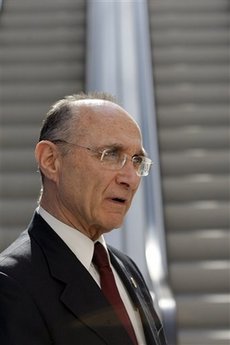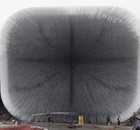Global General
Israel, Syria announce nuclear energy ambitions
(Agencies)
Updated: 2010-03-10 03:15
 |
Large Medium Small |
PARIS – Mideast rivals Israel and Syria on Tuesday each announced ambitions to develop nuclear energy, with Israel facing the prospect that its plan could bring new international attention to its secretive nuclear activities.
|
 Israeli Infrastructure Minister Uzi Landau speaks to media during an international conference on civilian nuclear energy, in Paris, Tuesday, March 9, 2010. [Agencies] |
"We need this energy source because it is environmentally clean," Israeli Infrastructure Minister Uzi Landau told The Associated Press in Paris. He called Israel's need for nuclear energy "imminent" but gave no timeline for an atomic power plant.
In an interview on the sidelines of the conference, Landau said his country would open up any nuclear plants to international inspections — but said he saw no reason for his country to allow inspectors into what are believed to be nuclear weapons sites, or to sign the Nuclear Nonproliferation Treaty.
Landau's announcement Tuesday could complicate US-led efforts to impose a new round of sanctions against Iran for its refusal to cooperate with international nuclear inspectors. Tehran says its uranium enrichment activities are peaceful but several world powers suspect it is seeking weapons.
Iran and the Democratic People's Republic of Korea (DPRK), whose nuclear program has also drawn international scorn, were not invited to the conference.
Landau stood firm against Iran's nuclear plans. Israel has never openly acknowledged being a nuclear power, following a policy it calls "nuclear ambiguity."
Minutes after Landau spoke at the conference, another of Israel's rivals, Syria, expressed nuclear interest.
Syrian Deputy Foreign Minister Faysal Mekdad said his country "calls for the need to consider alternative energy sources, including nuclear energy" to meet its growing demands.
"The peaceful application of nuclear energy should not be monopolized by the few that own this technology but should be available equally for all," Mekdad said, noting Syria's growing population.
Mekdad did not elaborate on specific nuclear plans.
The Israeli minister, asked about Syria's proposal, said any nuclear-energized country needs to have "responsible leadership that is also following all the measures and all the precautions ... to ensure that all the power plants that are built are used for peaceful means."
In 2008, Israeli warplanes struck a Syrian site the US alleged was a plutonium-producing reactor under construction secretly with help from the DPRK. Syria has maintained the site was an unused military installation.
Between the two countries, Israel is seen as closer to actually developing nuclear energy in terms of know-how and infrastructure.
Landau said nuclear plants built in Israel will be subject to strict safety and security controls, and even said his country would like to build them in cooperation with scientists and engineers from "our Arab neighbors." He did not elaborate.
Israel currently uses natural gas and coal, blamed in part for global warming, to produce electricity.
"Israel has always considered nuclear power to partially replace its dependence on coal," Landau said.
Asked whether Israel would allow inspectors from the International Atomic Energy Agency to supervise any new project, he said any nuclear plants "will undoubtedly be under the total procedures of those with whom we are in cooperation."
Still, he dismissed calls to sign the Nonproliferation Treaty, which aims to limit the number of countries capable of developing nuclear weapons.
"We don't see a reason why we should do it," he said.
The idea of generating nuclear energy has been floating around for years in Israel. In 2007, one of Landau's predecessors said he was working on a plan to build a nuclear power plant in Israel's southern Negev desert.
Landau met several months ago with the French Energy Minister Jean-Louis Borloo, and raised the idea of French-Israeli-Jordanian cooperation in developing a nuclear power plant.
Borloo was enthusiastic about that idea, Landau said. France derives more of its electricity from nuclear power than any other country and has a highly developed civilian nuclear industry — and Paris sees export potential.
It was France that, beginning in the 1950s, helped Israel build its nuclear reactor at Dimona. Israel is believed to have used that reactor to construct a stockpile of nuclear weapons.
Israel also has a smaller nuclear reactor for research at Nahal Soreq, not far from Tel Aviv.
"I don't think we need any inspections" at these sites, Landau told AP. "I don't think anyone in the international community has any problem with any of the Israeli initiatives in that area."
Landau's office says no specific plans to set up a third nuclear facility have been drawn up so far.










